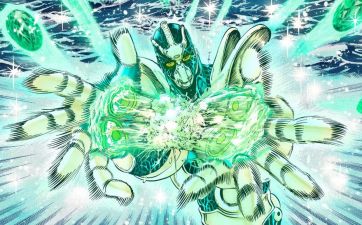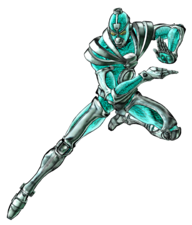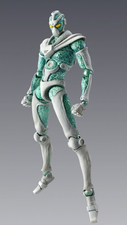Hierophant Green
Hierophant Green (ハイエロファント・グリーン, Haierofanto Gurīn) is the Stand of Noriaki Kakyoin featured in Part III: Stardust Crusaders. Hierophant Green is an elastic and remote Stand, capable of 'scouting' (as seen in the manga series in the fight against Strength) and performing actions from a distance. Kakyoin has possessed this Stand since birth.
Appearance/Personality
Hierophant Green appears humanoid, but robotic and with yellow eyes, and has green-colored appendages textured similarly to that of a cantaloupe. The exterior features of the stand sport a cream-white or beige color (as seen in the anime and video game). The composition of this Stand isn't solid; instead, it is a lengthy coil that can unravel at a moment's notice. Whenever the green appendages glow, the stand is priming for an attack, such as Emerald Splash. It is only slightly taller then Kakyoin himself, though it can stretch itself to great lengths. Green appears to not have ono personality, serving Kakyoin without hesitation or question (though Kakyoin mentions it hates wideopen spaces). It represents the Tarot Card The Hierophant.
Abilities
Hierophant Green is a unique Stand, the very first Long-Range Stand shown in the series, and it has a large amount of abilities to assist it in combat and scouting. Hierophant Green is also very sensitive to movement and can react very quickly. Its appendages can deliver an electrical shock in some cases. However, the Stand is relatively weak in direct hand-to-hand combat, as a trade-off for its great distance-based abilities.
- Marionette Control: Hierophant Green's most unusual ability, by extending its coils and sliding them into a person, Kakyoin is able to control that person. Hierophant Green is also capable of sliding into a normal person's body, allowing Kakyoin complete control of the person. This serves to protect Hierophant Green from attacks, as very few people are willing to attack an innocent person. Additionally, he can completely destroy the controlled being's air passage as he emerges, as well as the host's internal organs. When this ability is first used, Kakyoin is shown holding a marionette by the strings, but it is unknown if this is actually part of the ability, or just for dramatic effect.
- Coiled Body: As Hierophant Green is not a physical manifestation, but instead just a group of connected membranes, it is able to stretch itself to cover long distances. This means that, if attacked, it can simply uncoil itself to avoid damage, without hurting Kakyoin himself (as shown in the battle against Death 13). This also gives it the ability to work as a scout, as anything it hears is transmitted back to Kakyoin.
- Emerald Splash: Hierophant Green's most powerful ability. It gathers energy into its body, causing it to glow bright green, before firing off a large amount of energy which takes the form of emeralds. The blast's range and shotgun-like dispersion, along with its incredible destructive power, make Hierophant Green an extremely capable combatant. Before the blast is fired, a green slime-like material covers Hierophant Green's hands, a byproduct of the large amount of energy the attack is giving off. Interestingly, it seems that though this blast is extremely powerful, it is not extremely taxing on Kakyoin or Hierophant Green.
- Speed: Hierophant Green has been shown to have above average speed for a Stand, capable of sliding along the ground fast enough that even Jotaro can not keep up with it.
- Range: Unlike most stands who can only be active within a few meters of their user and loose power extremely fast outside of that range before fading away, Hierophant Green is able to be active for an extremely long distance from Kakyoin without losing any power, as shown with Kakyoin's bridge battle with Dio.
- Strength: Unlike most stands, Hierophant Green is not physically stronger than his user, as shown in the battle with ZZ's Wheel of Fortune, where he is unable to pull them up from a canyon because it would have torn him apart.
Gallery
Trivia
- His mouth is shown in the Chapter 123, page 12.
References





